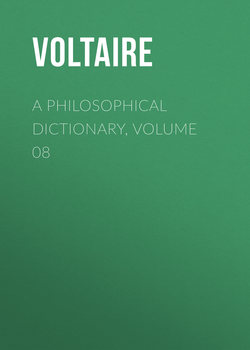Читать книгу A Philosophical Dictionary, Volume 08 - Voltaire, Вольтер - Страница 18
OPTIMISM
ОглавлениеI beg of you, gentlemen, to explain to me how everything is for the best; for I do not understand it. Does it signify that everything is arranged and ordered according to the laws of the impelling power? That I comprehend and acknowledge. Do you mean that every one is well and possesses the means of living – that nobody suffers? You know that such is not the case. Are you of the opinion that the lamentable calamities which afflict the earth are good in reference to God; and that He takes pleasure in them? I credit not this horrible doctrine; neither do you.
Have the goodness to explain how all is for the best. Plato, the dialectician, condescended to allow to God the liberty of making five worlds; because, said he, there are five regular solids in geometry, the tetrahedron, the cube, the hexahedron, the dodecahedron, and the icosahedron. But why thus restrict divine power? Why not permit the sphere, which is still more regular, and even the cone, the pyramid of many sides, the cylinder, etc.?
God, according to Plato, necessarily chose the best of all possible worlds; and this system has been embraced by many Christian philosophers, although it appears repugnant to the doctrine of original sin. After this transgression, our globe was no more the best of all possible worlds. If it was ever so, it might be so still; but many people believe it to be the worst of worlds instead of the best.
Leibnitz takes the part of Plato; more readers than one complain of their inability to understand either the one or the other; and for ourselves, having read both of them more than once, we avow our ignorance according to custom; and since the gospel has revealed nothing on the subject, we remain in darkness without remorse.
Leibnitz, who speaks of everything, has treated of original sin; and as every man of systems introduces into his plan something contradictory, he imagined that the disobedience towards God, with the frightful misfortunes which followed it, were integral parts of the best of worlds, and necessary ingredients of all possible felicity: "Calla, calla, senor don Carlos; todo che se haze es por su ben."
What! to be chased from a delicious place, where we might have lived for ever only for the eating of an apple? What! to produce in misery wretched children, who will suffer everything, and in return produce others to suffer after them? What! to experience all maladies, feel all vexations, die in the midst of grief, and by way of recompense be burned to all eternity – is this lot the best possible? It certainly is not good for us, and in what manner can it be so for God? Leibnitz felt that nothing could be said to these objections, but nevertheless made great books, in which he did not even understand himself.
